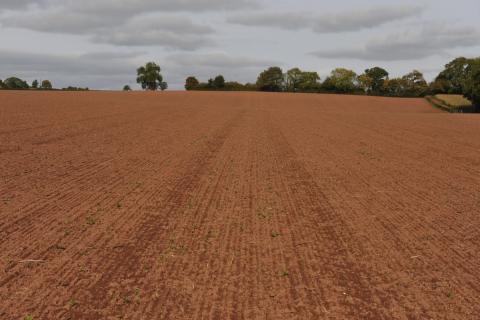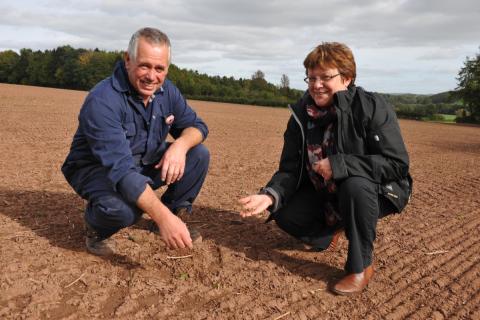Arable fields left bare over the winter can pollute watercourses but planting cover crops and ensuring drains and ditches are fully functioning can help farmers protect their soils and avoid possible prosecution.
During a Farming Connect event at Church Farm near Raglan, farmers were advised to be proactive.
Precision farming advisor Ian Beecher-Jones says there are several measures farmers can take to keep soil in fields and manage nutrient applications. “The soil is a farm’s crown jewels,’’ he insisted.
Cover crops sown after harvest, before spring crops are planted, provide winter cover and also act as a ‘water pump’, with the plant drawing moisture up from the soil and into the air, where it evaporates.
Cover crops prevent valuable nutrients leaching from the soil. “It is an environmentally friendly approach to modern farming,’’ said Mr Beecher-Jones. “When the ground is bare there is a poor water infiltration rate so water will pond on the surface.’’
Cover crops also provide green manure to improve soil structure and composition.
If the field is fenced and the crop can be grazed by sheep, either on tack or for home production, the income from those sources can cover the growing costs of the crop.
Poor management of water, such as drains not working correctly, will also result in nutrient loss.
“If drainage is wrong crops won’t grow and there will be more run off,’’ said Mr Beecher-Jones.
Many drains were established in the 1970s with grant funding but four decades later and some are failing, leading to fields becoming waterlogged.
Mr Beecher-Jones recommends pipe jetting drains to clear blockages. “It is an expense but you are going to be in a better situation if you clean drains because you will have better fields for growing crops,’’ he told farmers at the Farming Connect event.
“Study old drainage plans, walk ditch drains, install short term mole, ditch or furrow drains if appropriate. Map damaged areas for repair later in the season.’’
If soil is compacted it cannot absorb water. Mr Beecher-Jones explained that it is the first pass of a machine when a field is being worked that causes damage and reduces the water infiltration rate.
“If we can keep soil trafficking to controlled tramlines, regardless of almost anything else we do, our soils are going to be in better shape,’’ he said.
At Church Farm, the Phillips family grow mostly winter crops to avoid having fields bare over the winter period.
They also sow ryegrass on bare stubbles for grazing by sheep, to build up organic matter in the soil.
Fields have been subject to electronic scanning and zoning according to soil type, and zones are nutrient tested every four years; potash and phosphate are applied at variable rates.
“We have the soil nutrient level maps so we know where it needs to be applied. In some fields the application variation can be as high as 40kg a hectare,’’ said Colin Phillips, who farms with his wife, Yvonne, father, George, and nephew, Trevor.
“We are not using much bagged potash and phosphate now because we spread poultry manure. Variation in analysis between loads can be significant, and we have weigh cells on the muck spreader to make sure that it is spread at the correct rate.’’
Nichola Salter, Senior Environment Officer for agriculture at Natural Resources Wales (NRW), said the
actions being taken at the Phillips family were an example of best practice.
NRW has been monitoring the River Trothy as part of a national research and development programme.
The Trothy is currently failing its Water Framework Directive standards for phosphate with initial results showing unacceptably high levels of phosphate in the water which correlate to rainfall events, pointing to nutrient run-off from fields and farmyards.
Ms Salter said as rainfall patterns had changed and with fields being worked harder, farmers needed to re-evaluate how they managed their organic manures, soils and water.
She said Farming Connect had been crucial in getting advice out to farmers in the correct manner.
Dr Delana Davies, Arable and Horticulture Technical Officer at Farming Connect, said responsible and informed use of nutrients and proactive management of soils can reduce water pollution risks significantly.
“Use of Farming Connect nutrient management planning and infrastructure advisory services can help all types of farms ensure best environmental practice while also delivering cost benefits to their business as well,’’ she said.



